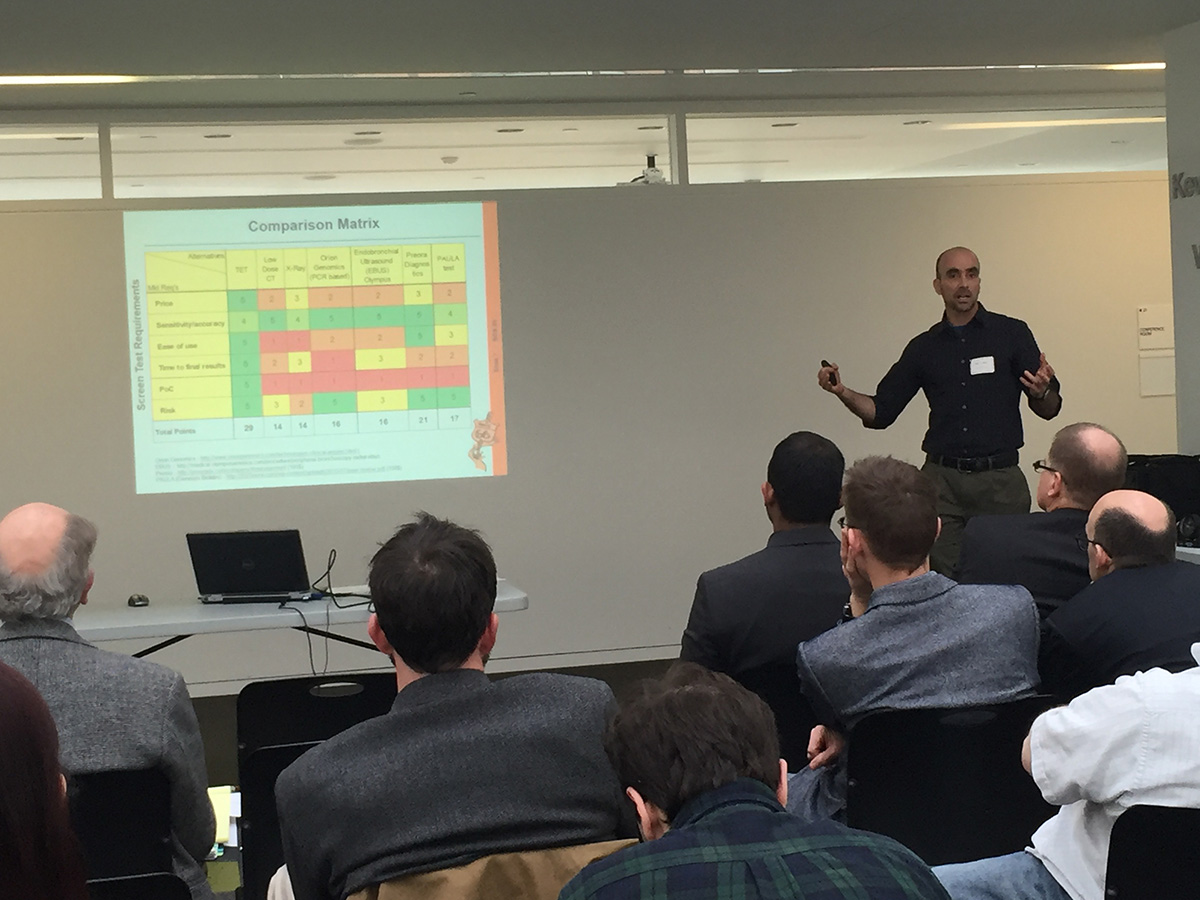Pre-Seed Workshop helps turn scientists into entrepreneurs
By Tom Fleischman

Jonathan Alden, a postdoctoral physics researcher, has high hopes that the biomolecule sensor he’s developed along with graduate student Alejandro Cortese will one day be an important tool in the diagnosis of human diseases.
But after an intensive weeklong workshop aimed at helping scientists gain entrepreneurial skills, Alden believes the animal disease market might be the logical first step.
“In talking to some of these experts, they told us that there was a lower regulatory hurdle to get into the animal market,” Alden said March 25, at the conclusion of the Pre-Seed Workshop (PSW), put on by the Center for Advanced Technology, under the auspices of the Cornell Institute for Biotechnology. Marla Coppolino organized and hosted the event, held at the Kevin M. McGovern Family Center for Venture Development in the Life Sciences.
“Now we’re at least looking in that direction,” Alden said of he and Cortese, who’ve been working on their technology for three years. “Maybe once we start bringing in revenue, we could switch directions a little bit in order to do the more cost-intensive R&D that is required for the human market.”
That’s the kind of business boost would-be entrepreneurs can get from the PSW, which started in 2004 in Rochester, New York, and is held roughly 10 times a year at various universities in the Northeast and in Europe.
The team led by Alden and Cortese was one of six that presented their ideas for new products or technologies March 25. A three-person panel listened to the presenters, then asked probing questions related to science and business.
“It’s definitely not a competition, it’s about providing feedback,” said panel member Felix Litvinsky, managing director for Blackstone LaunchPad, which offers members of the Cornell community free, confidential entrepreneurial mentorship.
“It’s about assessing the viability of a particular idea and understanding how the entrepreneurs in health or life sciences approach the market,” Litvinsky said. “Do they understand the pitfalls?”
The role of the panel – which included Zachary Shulman ’87, J.D. ’90, director of Entrepreneurship at Cornell; and Alan Lee, senior investment manager of Excell Partners – was one of potential investor. Their goal is helping each team answer two big questions: Do you have a business case? Is it investable?
The workshop started with a kickoff dinner March 17, with a full slate of activities the following day. Coppolino builds the teams over the course of several months; groups typically consist of an “idea champion” (scientist), a business professional, an intellectual-property or business startup attorney, a tech transfer officer and a business coach.
The first working day includes a series of intensive exercises, designed to take the teams through the aspects of building a business plan. There are lectures on defining the market for the technology, learning who the competitors are and how to determine the physical space required for the business, and more.
After each lecture, teams meet in private breakout sessions to apply the lessons to their technology and startup plans.
Being able to function together is important in any team or group situation, and building a startup is no different.
“We’ve put three years in on this project,” Cortese said, “and to do things in parallel efficiently, and to spend that many hours with somebody, you do have to enjoy their company. Jonathan and I have at least made it over that hurdle.”
Other presenters included:
- Roy Cohen, research scientist at the Baker Institute for Animal Health, whose Tethered Enzyme Technology uses biomarker detection to screen and monitor for lung cancer and other pathologies;
- Jonathan Butcher, associate professor in biomedical engineering, whose technology is capable of quantifying local mechanical and bioelectrical characteristics of soft tissue for early diagnosis of preterm birth;
- Magnolia Ariza-Nieto, research associate at the Cornell Center on the Microenvironment and Metastasis, whose EpiWELL diagnostic kit is a precision medicine tool to monitor changes in the human epigenome in response to stressors;
- Rana Zadeh, assistant professor in the College of Human Ecology, whose team is working on a sleep-monitoring system for bedbound hospital patients; and
- Mingchee Tan and Kirk Samaroo of bio-tech startup Dynamic Boundaries. Tan and Samaroo have developed a polymer solution aimed at easing symptoms of dry-eye syndrome, which affects approximately 20 percent of the U.S. population.
Media Contact
Get Cornell news delivered right to your inbox.
Subscribe